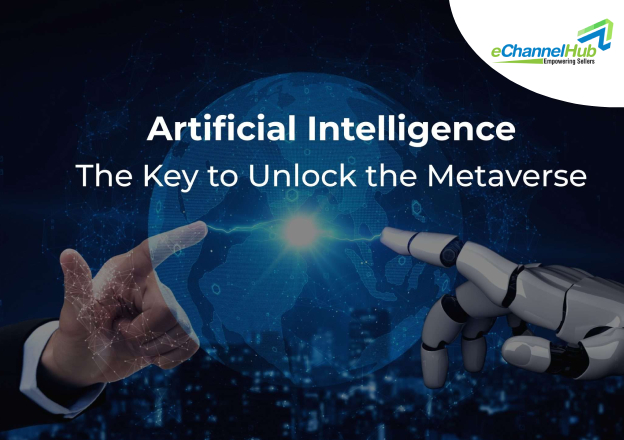What role does Artificial Intelligence play in the development of the Metaverse?

Artificial Intelligence is changing the way in which industries interact, but not only that, but also the way in which new ones are created, which is why in this article I would like to tell you a little about my vision of the Metaverse and how it is that the Artificial Intelligence is being a fundamental part of its creation.
In 2017, Sundar Pichai, the CEO of Google announced a change in direction from “ mobile first ” to “ AI first ” and Zuckerberg is doing it in the same way with Meta (although he is not the only participant in creating a Metaverse world . Mark Zuckerberg mentioned at the recent “Inside Lab” Meta AI conference that Artificial Intelligence is perhaps the most important technology to enable the Metaverse.
The seven layers of the Metaverse
Joan Radoff proposes the seven layers of the Metaverse and in each of them we see interference from Artificial Intelligence:
Let’s start by exploring each of these layers:
- Infrastructure:
The continuous growth of the development of a Metaverse has operational requirements that pose great challenges of massive scalability, which is why the role of AIOps (Artificial Intelligence Applications whose function is to improve the operations of IT systems) will be vital. to be able to carry out the administration of all the necessary infrastructure (hardware, server software and logistics) to be able, on the one hand, to take advantage of the AI capabilities of machine learning, Big Data management and computational analysis and thus be able to carry it out intelligent, fast and efficient way, being able to detect problems early and solve them quickly.
- Human Interface:
The success or failure of this technology will be largely due to its ability to make user interfaces inclusive, because although this can improve social interactions for some, it can also become a highly exclusive technology for people. with different capacities can access this virtual world. In other words, we must be able to develop interfaces for people with visual limitations such as accessories that allow image recognition, automatic translation, and even intelligent exoskeletons to interact with the virtual world, in addition to the current development of smart glasses, wearables, haptic gestures , biosensors and even neural interfaces. All this to ensure that this new space is a safe place for all people regardless of their physical and psychological capacities.
- Decentralization:
A fundamental aspect within the Metaverse development service will be linked to security and decentralization, hence it should not only be developed by a single company (coff coff… Meta). The Metaverse will allow creators to generate a new digital economy in which digital assets and rights can be easily traded, protecting property and ensuring the disintermediation of both technology and banking companies.
In this sense, smart contracts will become a kind of smart contracts on steroids by incorporating AI technologies to improve the efficiency and security of transactions in the Metaverse. Today we are not too far from that. For reference, last year one of the largest crypto platforms, IOTA , introduced a new decentralized network of AI-enhanced smart contracts called “Assembly” for Web 3 and the Metaverse.
- Spatial Computing:
What he proposes is a dematerialization of physical space, the power to have a hybrid compound of the “real” and the virtual. (Note, I mean the “real” in quotes because at this point, who can define what is or is not real?… Maybe that will be another whole topic for a post) but basically we are talking about Artificial Intelligence to create immersive digital worlds .
This already forms a large category within the spectrum of technology because it allows us to enter and manipulate spaces in N Dimensions, and not only that, but also augment the “real” world with more information and new experiences. Omitting for now the software that is required for the spatial computation, key aspects of the software include:
- Geometry and animation will be displayed using 3D engines (Unity and Unreal).
- Geospatial mapping (Niantic Planet-Scale AR and Cesium) and object identification are two methods for mapping and interpreting the internal and external worlds.
- gesture and voice recognition
- Integration of Internet of Things (IoT) device data with biometrics (for identification and for use in privately developed applications like health and fitness)
- Newer user interfaces that facilitate information flow and analysis at the same time
In order to do this, businesses like Ready Player Me, MetaHuman, Wizard Engine, and NVIDIA’s Omniverse have already been actively utilizing AI to aid in the creation of avatars, personalities, and virtual environments.
- Creative economies:
In a personal capacity, I must say that this seems to me to be one of the most amazing topics thanks to what it will be able to enable by being in a decentralized ecosystem and with the capacity to democratize creation opportunities because not only the While experiences are becoming largely immersive, they are also combining a series of economic, social and temporal factors that give rise to a prototyping space where creators can pivot new ideas.
Creative economies have previously developed at different milestones of maturity, starting from the pioneer era to the era of no-code creators . However, speaking specifically of the Metaverse, so far we are in a stage driven by more experienced developers ( engineering era ) managed mainly by creators like Roblox, Rec Room and Manticore where they have highly complex integrated tools that have allowed them to monetize. However little by little we will also start to see no-code tools like Bueno .
- Discovery:
At this stage of the discovery of technology around the Metaverse, AI plays a very interesting role from two main approaches to information: inbound (when people are actively searching for information) and outbound (marketing/information that people do not necessarily request).
For this, some Artificial Intelligence Models are used:
Inbound
- Content recommended by “content communities”: It recommends information regarding the same category of content.
- X amount of your friends liked this app: Referral for “affinity clusters with people on your friends list”
- Search engines: Different search engines have algorithms that decide what to show you given your location, age, income level, etc.
Outbound:
- Ad Display: Just like search engines, advertisers apply different algorithms to decide whether or not to show you an ad given your previous interactions or profile.
- Spam: Contrary to receiving ads, spam prevents you from receiving it given certain criteria to decide if this is truthful and segmented information for you.
- Experience:
As we already started saying in point 4 about the required software. The great experience of the Metaverse is not based on turning elements, objects or places from 2D to 3D but their complete dematerialization .
And what happens when we manage to dematerialize the “physical”? Magic happens. Previously scarce experiences due to their limitations in the physical world become a reality. Video games have already given us a taste of this: Did you dream of being a footballer? Now you can be with EA SPORTS™ FIFA 23! Have you always wanted to fly a plane? Here is your flight simulator!
Now imagine that this can be done with more familiar experiences, for example being in the front row of your favorite artist without having to pay more, or perhaps walking through the streets of a city on the other side of the world with every detail of the city or even revive dead artists or characters by rescuing their tone of voice, their personality and creating a replica through training an algorithm and modeling the character in the Metaverse.
And in fact, to achieve this “dematerialization” part of what is done is to generate many images of objects, places or physical elements and then render them with Artificial Intelligence without the need to make a detailed 3D model, which also facilitates scalability.
So, with all this we see how the development of the Metaverse and its experience would not be possible without Artificial Intelligence that enables key aspects for the development of this technology and what do you think? For all this, new jobs will be generated. That is why today more than ever I am optimistic about the future of work based on all the opportunities that open up for those of us who are dedicated to the study and development of Artificial Intelligence.
I would love to read what you think about this vision and what you think will be the trends around AI and the Metaverse, for now, as my friends at Blackbot say “ See you in the future”.
Author Bio :
RAGUNATH.T is a Digital Marketing Executive at BlockchainX . He designs marketing strategies with the intention of using high-quality content to educate and engage audiences. His specialties include social media marketing specialist, SEO, and he works closely with B2B and B2C businesses, providing digital marketing strategies that gain social media attention and increases your search engine visibility
Write For Us
Gain multichannel inventory visibility and control with eChannelHub
Learn more about eChannelHub with a free demo, tailored for your unique retail business.
Request A DemoRequest a Demo
Gain multichannel inventory visibility and control with eChannelHub
Learn more about eChannelHub with a free demo, tailored for your unique online business




